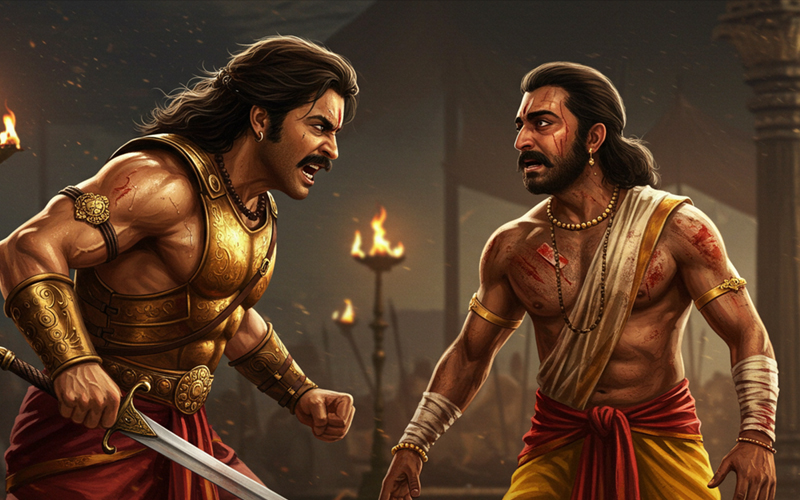Physical Address
Empirical System, 105 First Floor Pitru Krupa, Opp. R.K. Desai College, Koparli Road, Vapi (Gujarat) 396 191
Physical Address
Empirical System, 105 First Floor Pitru Krupa, Opp. R.K. Desai College, Koparli Road, Vapi (Gujarat) 396 191

Blinded by his own pain and shame, Yudhishthira unleashed a torrent of accusations. His words, sharper than any arrow, pierced Arjuna’s soul.
For Arjuna, this was not just an insult. The Gandiva was an extension of his soul, a symbol of his Dharma and his very identity. To be asked to give it up was a fate worse than death.
A secret, terrible vow burned in Arjuna’s heart—he had sworn to kill anyone who ever dared to ask him to surrender his Gandiva. Now, his own brother had spoken those words.
Consumed by an explosive fury, Arjuna drew his sword, ready to commit the ultimate sin: fratricide.
In that tense, terrifying moment, Lord Krishna intervened. He stood between the brothers, his calm presence a stark contrast to Arjuna’s rage. “Arjuna,” he asked, “there is no enemy here. Why have you drawn your weapon against your own kin?”
The confrontation between Arjuna and Yudhishthira is one of the most emotionally charged and spiritually profound moments in the Mahabharata. To truly feel the tension, the anger, and the divine wisdom that saved them, we have brought this powerful story to life on our YouTube channel, Vibes of Divinity.
Witness the moment a brotherhood was tested and see how divine grace prevailed.
Don’t forget to like, subscribe, and hit the notification bell to continue your journey into the heart of divine stories with us!
Facing Krishna, Arjuna explained his vow. But Krishna gently and firmly corrected him, explaining the deeper, more subtle nature of Dharma.
Following Krishna’s advice, Arjuna unleashed a volley of harsh words at Yudhishthira, using disrespectful language and questioning his courage. He symbolically “killed” his brother with insults, thus fulfilling his vow.
But the moment the words left his mouth, Arjuna was consumed by guilt. The shame of disrespecting his elder brother was so great that he once again raised his sword, this time to end his own life.
Again, Krishna stopped him. “Suicide is an even greater sin,” he explained. “To atone, now do the opposite. Proclaim your own greatness. In doing so, you will humble yourself before your brother, a symbolic death of your own ego.”
Arjuna did as he was told, boasting of his prowess. Then, dropping his weapons, he fell at Yudhishthira’s feet, begging for forgiveness.
Yudhishthira, initially shaken by the insults, was then guided by Krishna, who explained the whole situation. Understanding the divine play that had just saved them from a terrible sin, Yudhishthira embraced his weeping brother. Their tears washed away the anger and grief, purifying their bond.
Their brotherhood, though tested by fire, emerged stronger. With their hearts reconciled, they turned their focus back to the true enemy, their resolve to defeat Karna now unbreakable.
This powerful episode teaches us that our greatest battles are often fought within. It highlights that:
As Krishna’s wisdom reminds us: “True wisdom lies in restraint—pause before you act, think before you speak. Real strength is knowing when to rise above.”
What does this story teach you about handling anger and conflict within a family? Share your reflections in the comments below!